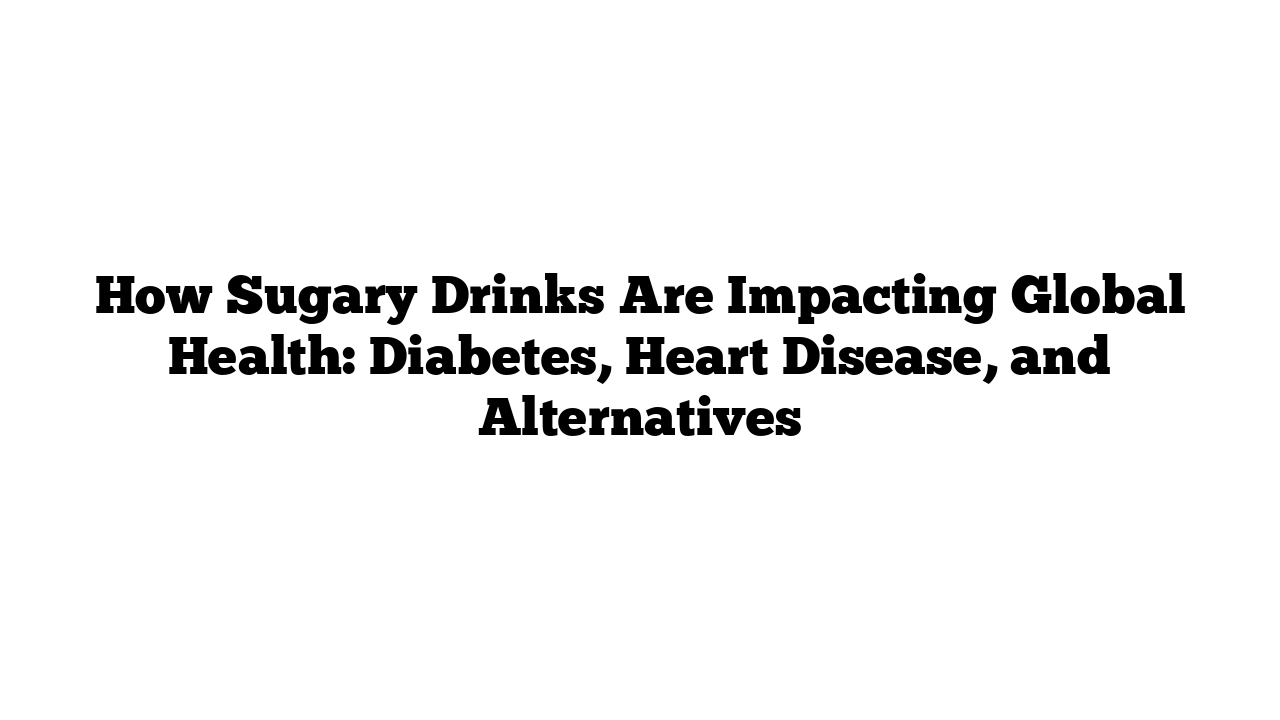Sugary drinks are a staple in many diets worldwide, but their health implications are far from sweet. Research has increasingly linked sugar-sweetened beverages to a rise in type 2 diabetes, cardiovascular disease, and even premature death. This article explores the widespread impact of these drinks, their role in global health crises, and healthier alternatives.
The Connection Between Sugary Drinks and Chronic Diseases
1. A Global Epidemic
A study involving data from 184 countries has revealed that millions of cases of type 2 diabetes and cardiovascular diseases each year are directly attributable to sugar-sweetened beverages (SSBs). This includes sodas, fruit drinks, and other sugary beverages.
2. Rising Rates of Diabetes and Heart Disease
The overconsumption of sugary drinks is fueling a sharp rise in type 2 diabetes and heart disease worldwide. Excess sugar in the bloodstream contributes to insulin resistance, leading to diabetes. Simultaneously, high sugar intake raises triglycerides and blood pressure, increasing the risk of heart disease.
- Diabetes: Studies suggest that people who consume sugary drinks daily have a 26% higher risk of developing diabetes.
- Heart Disease: Regular SSB consumption increases the risk of dying from heart disease by 31%.
Why Sugary Drinks Are So Harmful
1. Empty Calories and Weight Gain
Sugary drinks are packed with calories but lack any nutritional value. Frequent consumption can lead to weight gain, a significant risk factor for diabetes and cardiovascular issues.
2. Spikes in Blood Sugar Levels
Consuming sugary drinks causes rapid spikes in blood sugar levels, stressing the pancreas and leading to insulin resistance over time.
3. Hidden Sugars in Everyday Beverages
Many people underestimate the sugar content in popular drinks like sweetened teas, energy drinks, and even flavored waters. For instance:
- A single can of soda contains about 39 grams of sugar.
- Some “healthy” fruit juices contain as much sugar as sodas.
The Global Burden of Sugary Drinks
1. Health and Economic Impact
The health consequences of sugary drinks are not limited to individuals; they have a massive economic burden as well. Treating diabetes and heart disease costs billions annually.
2. Disproportionate Impact on Developing Nations
Low- and middle-income countries are particularly vulnerable due to the lack of awareness and access to healthier alternatives.
Sugary Drinks and Premature Deaths
1. The Risk of Early Death
A Harvard study has found that drinking sugary beverages is linked to a higher risk of premature death. The more sugary drinks consumed, the higher the risk.
2. A Call for Action
This evidence underscores the need for governments and health organizations to regulate the sale and marketing of sugary beverages.
Healthier Alternatives to Sugary Drinks
1. Water with a Twist
Add lemon, cucumber, or mint to plain water for a refreshing and hydrating alternative.
2. Unsweetened Teas
Green tea, herbal teas, and black tea are excellent sugar-free options that also offer health benefits.
3. Sparkling Water
For those who crave carbonation, sparkling water with a splash of natural fruit juice is a great choice.
4. Smoothies
Blend fresh fruits and vegetables at home for a nutrient-packed drink without added sugars.
Steps to Reduce Sugary Drink Consumption
1. Read Labels Carefully
Look for hidden sugars on nutrition labels. Ingredients like high-fructose corn syrup, sucrose, and molasses indicate added sugars.
2. Gradual Reduction
If quitting sugary drinks feels daunting, start by reducing portion sizes or diluting them with water.
3. Awareness Campaigns
Public health initiatives like sugar taxes and awareness campaigns have proven effective in reducing SSB consumption in several countries.
For more health tips and alternatives, visit medicaltimes.io.
FAQs About Sugary Drinks and Their Impact on Health
- What are sugar-sweetened beverages (SSBs)?
SSBs include sodas, fruit juices with added sugar, sweetened teas, and energy drinks. - How do sugary drinks affect diabetes risk?
Excess sugar leads to insulin resistance, increasing the risk of type 2 diabetes. - Why are sugary drinks bad for heart health?
They raise triglycerides and blood pressure, increasing the risk of cardiovascular disease. - Can children drink sugary beverages?
It’s best to limit sugary drinks for children to prevent long-term health issues like obesity and diabetes. - Are “natural” fruit juices safe?
Even natural fruit juices can be high in sugar and should be consumed in moderation. - What are some sugar-free drink options?
Water, unsweetened tea, sparkling water, and homemade smoothies are healthier choices. - How does soda compare to energy drinks?
Energy drinks often have even more sugar than sodas and may also contain harmful levels of caffeine. - Do sugary drinks impact mental health?
Some studies suggest a link between high sugar consumption and an increased risk of depression. - Are sugar taxes effective?
Yes, countries that have implemented sugar taxes have seen significant drops in sugary drink consumption. - Can occasional sugary drinks harm you?
Occasional consumption is less risky, but frequent intake can lead to serious health problems over time.
